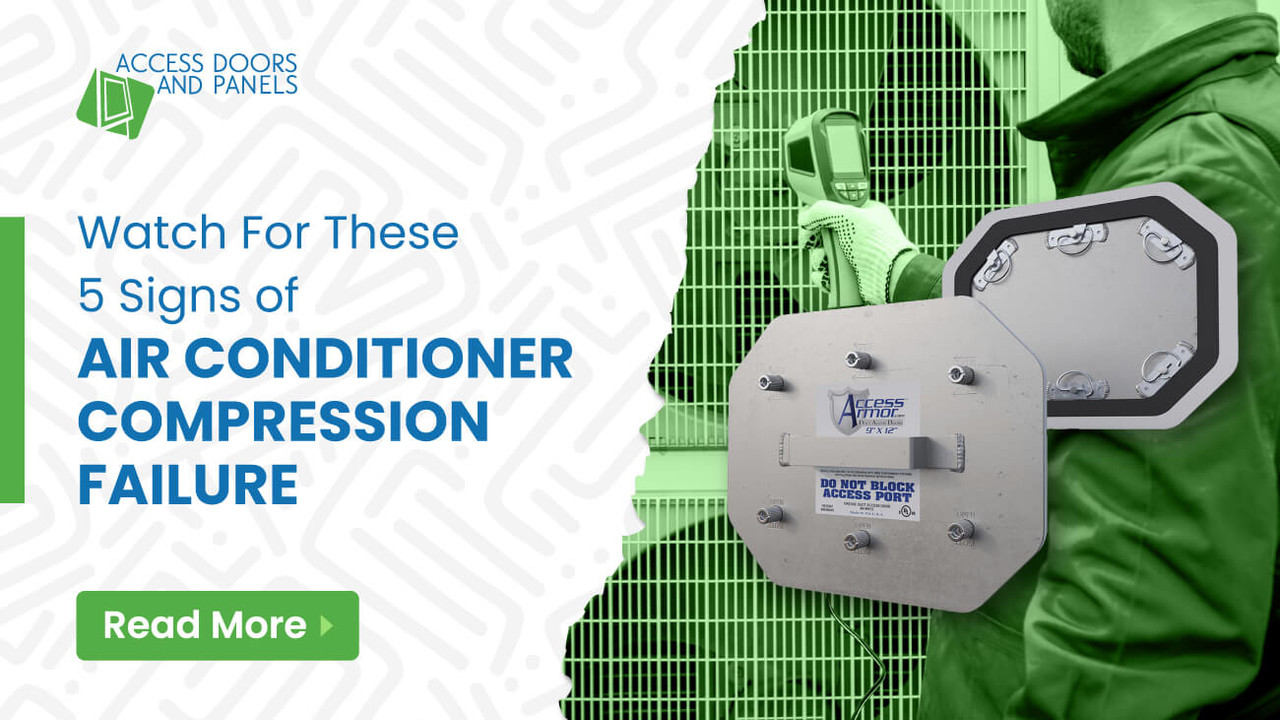Watch For These 5 Signs Of Air Conditioner Compression Failure
Posted by Access Doors and Panels on 25th Jan 2023
We often rely on our air conditioners during the summer to keep our homes and businesses cool. For this reason, we should always keep our air conditioners clean and well-maintained.
Several components come together to form the system of your air conditioner, but none are as essential as the heart of the operation— the compressor. Because of the importance of the air compressor, it's crucial to watch out for any signs of failure.
What Is An Air Conditioner Compressor?
Before checking for signs of compression failure, it's necessary to understand its role within the entire system.
The refrigerant flow between the indoor and outdoor segments provides a cooling effect, and the unit responsible for pumping the refrigerant is your compressor unit.
Because of the compressor's necessity within your air conditioning system, you should always ensure it's running correctly. These are the signs you should watch out for, signaling that you must get your compressor unit checked.
5 Signs Of Compression Failure
#1 - Lower Than Usual Airflow
There are various culprits when your HVAC unit has weaker airflow. However, reduced airflow is one of the earliest telltale signs of compression failure. As a result, your indoor spaces may feel like they need to be colder, and you start lowering your thermostat temperature further.
For this reason, it usually takes much work to spot this problem early on. As the compressor continues to fail, you may notice that your air conditioner starts to blow warm air even though it is in its "Cool" setting.
So if you ever have any problems where airflow seems to be going down or your system isn't cooling as it should, you should call a professional HVAC service to check if your air conditioning is working as intended.
#2 - Banging Noise
The latest innovations in technology have allowed air conditioners to run near silently. If you notice a banging noise when turning on your air conditioner, it's time to check for its sources. Because compressors are one of the more expensive items in your AC unit, so you should eliminate any other potential sources.
Firstly, a banging noise itself may not be from the compressor. It could come from loose screws or dirt in your condenser unit. You should ensure that you tighten down any screws. You should also ensure your unit is clean and free from debris by checking your ducts through your AA UL duct access panels. If the noises remain, you should turn off your air conditioner and have it checked by an HVAC maintenance service to ensure that your air conditioners don't get damaged.
#3 - Refrigerant Leaks
Another problem that could lead to an AC compressor's internal failure is a refrigerant leak. As mentioned, your air conditioner relies on the refrigerant for heat transfer, and your compressor is responsible for pumping the refrigerant between the hot and cold sides.
A refrigerant leak means that your compressor has nothing to pump, causing it to break down and need replacement.
Your refrigerant relies on changing from high pressure to low pressure to do its job. As such, the refrigerant lines are usually under pressure, and you should listen to hissing noises from your AC unit. If you hear one, you should immediately contact a specialist to seal the leak and top up your refrigerant to ensure your air conditioner remains tip-top.
#4 - Spike in Electricity Bills
Suppose you start to notice an increase in your electricity bills without any significant changes to how you use your air conditioning.
If your compressor unit has problems, it works harder to cool your interior spaces and requires more electricity. The increased workload on your compressor also introduces additional heat to other components, resulting in higher repair costs. It would be best if you got in touch with a maintenance specialist as increased electricity bills are one sign of air conditioner compressor problems, and it's best to address this problem early before other components start to break.
#5 - Frequently Tripping Circuit Breakers
Circuit breakers work to protect your electrical devices from power surges or from drawing too much power. If your outdoor unit constantly trips the power breaker, it's usually a sign that your compressor draws more and more power to a level your electrical lines may not handle.
When this happens, it's usually a sign of air compressor failure. You'll likely need to replace it with a new unit to ensure your system runs optimally with its regular power consumption.
Use Only The Best From Access Doors And Panels!
We at Access Doors and Panels commit to giving you the highest-quality access doors from various reputable manufacturers in North America. We have an extensive lineup available on our website. If you have a project with special requirements, we also cater to any custom requirements you may have!
If you have any questions, our product experts can answer them immediately! Contact us today at (800) 609-2917. We'll love to help you get the most suitable access panel for your indoor and outdoor spaces.

